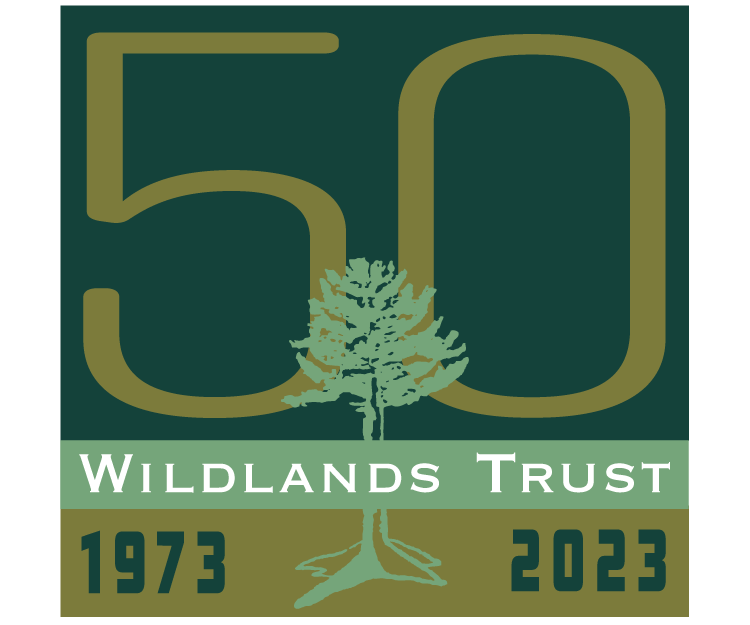Belle [Hartwell] Barnes with the new Hartwell Family Preserve sign at Davis-Douglas Farm in Plymouth.
In land conservation, context is key. Even a relatively small parcel can derive significant value from the people and places it connects through space and time.
In Pembroke, an unassuming woodland looms much larger than its 7.9-acre frame when viewed within its geographic and historical context. Thanks to a generous family donation, this small yet meaningful property will carry an outsized impact on the local and regional landscape for generations to come.
Last December, Belle and Michael Barnes donated the Hartwell Family Preserve to Wildlands Trust in honor of Belle’s mother, Thelma Hartwell. Thelma placed a Conservation Restriction (CR) on the land in 1980, when the state CR program was in its infancy.
“Thelma was a conservationist ahead of her time,” said Wildlands Director of Land Protection Scott MacFaden. In addition to protecting her own land, Thelma served on the Pembroke Conservation Commission and wrote nature-based articles for local newspapers.
Hear from Belle and Michael Barnes themselves about their decision to donate the family land:
We are privileged to be able to donate the “Hartwell Family Preserve” in memory of Everett and Thelma “Teddy” Hartwell to Wildlands Trust. In 1953, Everett and Thelma Hartwell built their home at 347 Pleasant Street in East Pembroke, on a portion of property that had been in the Hartwell family since the early 1920s. They raised Everett’s sons Bob and Karl, and their children Belle and Wayne, to appreciate both the importance of stewardship of the land and the amazing habitat of flora and fauna it contained. Teddy was a die-hard conservationist with a passion for protecting our natural resources, especially wetland areas. Her career as an educator involved her teaching history, biology, and chemistry for many years. When her children were born, she housed a private kindergarten at the property and taught her students an appreciation of the nature around them. In later years, when she returned to working outside the home, she taught “Outdoor Education” for the Audubon Society in several area school systems. In the late ’70s, when she could no longer work outside the home, she wrote several articles for the Silver Lake News, focusing on subjects about protecting and enjoying our natural resources. She served on Pembroke’s Conservation Committee for several years. She helped to create two nature trails, one in Pembroke and one at Camp Wing in Duxbury. She was considered a visionary by some for putting the majority of the property’s acreage into a Conservation Restriction to forever protect this amazing ecosystem. For the above reasons, we chose to donate this land, and are thankful to Wildlands for carrying on our family’s legacy.
– Belle [Hartwell] and Michael Barnes, April 2024
In addition to this rich cultural legacy, the Hartwell Family Preserve holds significant ecological value:
Protects wildlife habitat of statewide importance: The property lies within multiple areas identified by the Commonwealth’s Natural Heritage and Endangered Species Program as significant wildlife habitats, including:
BioMap Core Components
Aquatic Core
Rare Species Core
BioMap Critical Natural Landscape Components
Aquatic Core Buffer
Landscape Blocks
BioMap Elements
Core Habitat
Critical Natural Landscape
Provides habitat and recreational connectivity: The property directly abuts a 268-acre expanse of open space owned by the Town of Pembroke. Said expanse formerly contained a reservoir used by cranberry growers, but the dam holding the reservoir breached in the early 1990s. The former reservoir area now contains a rich diversity of wetland types along the daylighted riparian corridor.
Wildlands will manage the Hartwell Family Preserve as Forever Wild, giving local flora and fauna a permanent place to thrive in a rapidly changing world.
We sincerely thank Belle, Michael, Thelma, and the rest of the Hartwell family for their commitment to preserving the natural beauty of our region.
To explore opportunities to conserve your land with Wildlands, click here.













